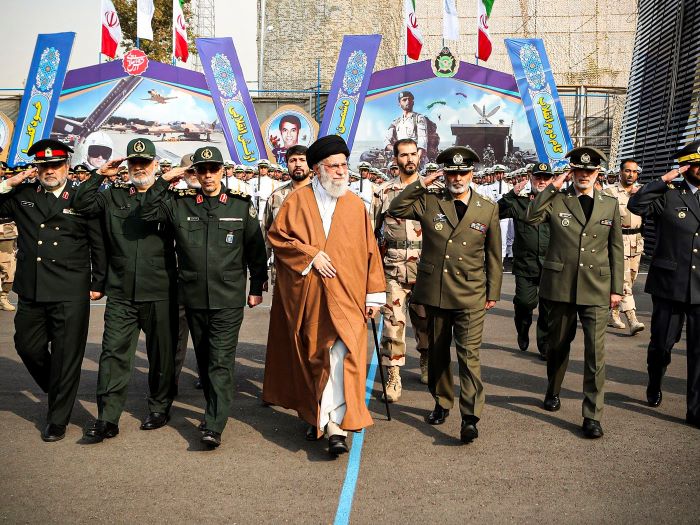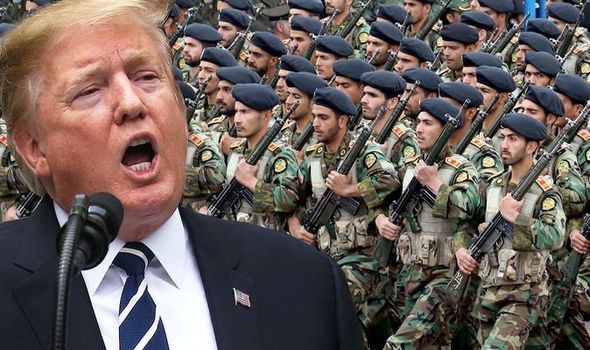Swinging Nuclear Pendulum between US and Iran
Will the US-Iran pendulum continue to swing even with uneven speeds over the West Asian landscape?
Like, Share, Comment…be the Voice of Free Press
By Anil Trigunayat,IFS, Copy Edited By Adam Rizvi TIO: Trump era has perhaps been the most difficult period for the Ayatollah Khamenei regime, as their hopes of reintegrating into the global and regional chains via the JCPOA (Joint Comprehensive Plan of Action 2015) came crashing down when the USA withdrew from the nuclear deal in 2018. While COVID-19 debilitated Iranians the most in the region, incremental and crippling sanctions until the last day of the Trump regime devastated its economy and choked its commercial and oil outlets, and prevented market access. But having been accustomed to sanctions for decades, Iran did survive and also maintained strategic patience despite erratic Trump egregiousness, maximum pressure tactics, and killings of its IRGC General Qasem Soleimani in Baghdad as 2020 began. It has been hoping that Trump’s bullying would end, and prospective candidate Biden will take over and honor the JCPOA which could alleviate its suffering and open the way yet again. Overtly it maintained an intransigence by continuing to enhance its uranium enrichment threshold as a tactical venture by putting greater pressure on the E3 (France, Germany, and the UK) to keep the nuclear ball rolling.
Also, Read: Israel’s Power over America Is Far Down

As it became clear that Joe Biden would be the next President and wished to re-join the JCPOA, Trump made every possible effort to create a fait accompli for his successor especially in West Asia against Iran as he continued with his maximum pressure tactics and more focussed sanctions trying to provoke the Iranian Mullahs to make a strategic mistake. B52 bombers flew over the Gulf and USS Nimitz stayed on to counter any potential Iranian attack. Abraham Accords were signed and expanded between Israel and several Arab states as an anti-Iranian coalition of sorts, even if UAE did not overtly consider Iran an enemy state and remains engaged. Last order was the sale of 50 F35s to Abdu Dhabi. Tehran and Tel Aviv would like to erase the other from the face of this earth. While Iran continued to use its proxies with 3H i.e., Houthis, Hamas, and Hezbollah against the known regional targets as well as against Americans in Iraq, it flagged its Hormuz Peace Plan for regional security, stability, and tranquillity.
Also, Read: Iran summons Turkish ambassador over Erdogan remarks in Baku
The situation remains tense as Iran not only is losing its patience due to domestic challenges and economic deprivation but also due to smart attacks on its nuclear assets, installations and scientists. It cannot afford to not react publicly when it accuses Netanyahu and his Mossad for such attacks. It has also indulged in cyber attacks as a counterpoint. As French President Macron talked to President Biden, they agreed to act together and coordinate the middle east especially the Iranian nuclear issue, which is getting critical by the day. Biden had maintained that if Iran returned to strict compliance with the nuclear deal, the US would join as a starting point for follow-up negotiations’. A decision to reverse Trumps’ recent sanctions on Houthis enmeshed in the worst humanitarian crisis might send a good signal. Tehran expects alleviation and lifting of some sanctions as a goodwill measure, as the US overcomes its hesitation to re-join the JCPOA. Iran will also have to work out a verifiable reversal of the enrichment up to 20% which is already six times that of the permissible limits under the Nuclear Plan of Action. Even though FM Zarif and others have maintained that it will be rolled back if the US returns to the table, it is not clear if this act of Iran is to acquire the requisite threshold or is part of mere saber-rattling. Biden had decried Trump’s Iran policy and withdrawal from JCPOA fraught with “dangerous consequences”. As Vice President, in the Obama Administration, he was very much a part of the historic deal to contain Iran’s nuclear ambitions, even if it was not perfect.
Also, Read: Many Uses Of Al Baghdadi: Why Did They Kill Him?
Iran’s problem is more domestic as conservatives become more powerful. President Rouhani and FM Zarif have received their unfair share of criticism from the conservative Majlis members and the spiritual leader himself. Most recently, Zarif was criticized for his interview with “Der Spiegel” and the meeting with US officials after three weeks of the killing of IRGC General Soleimani, at which reportedly an Israeli affiliate was present. His answer to the Foreign and Security Committee that “The person who wanted to negotiate on behalf of the Americans… was accompanied by another person, and it was later revealed that he had resided in Israel for ten years” was criticized unequivocally as Zarif pledged to comply with the instructions of Supreme Leader Ali Khamenei on the Nuclear Agreement. As per reports, the questioning session was attended by 259 deputies out of 290, where 173 voted against Zarif, while 55 declared their support for his positions and 18 abstained. This clearly shows that the conservative parliamentarians will have a greater sway unless the Supreme Leader commands them otherwise. Accordingly, in an article in Foreign affairs Zarif said that return to the table will be jeopardized if Washington or EU allies demand new terms for a deal.
Also, Read: Macron Walking Around Numerous Minefields Raises Islamophobia To Fight Islamic Terror

Even though there is some hope of the Biden Presidency trying to break the ice, Iranians are not refraining from provocative acts and alignments. It was reported that a Bill has been introduced in the Parliament outlining “The conditions for negotiating with Washington and supporting Tehran’s allies”. It seeks to create a NATO-like structure called “Axis of Resistance” which might include Iran, Syria, Lebanon’s Hezbollah, the Houthi-led government of Yemen, Iraq’s Popular Mobilization Forces (PMF), Hamas, and Palestinian Islamic Jihad. The collective defense and security might be the stated objective. Israel is an obvious adversary hence it seeks to operationalize the intent “When Israel attacks one of the Resistance Front countries or if Israel takes any action against this axis, the other member states of the group must exert all of their efforts in the military, economic and political aspects to ward off the threat.” It is likely that the Axis might seek broader collaboration from Turkey, China, Pakistan, and Russia who have developed closer ties with Tehran in recent times. While the creation of an Axis of Resistance might be a response to Abraham Accords, the fact remains that any conflagration and violent escalation in the region will have unprecedented ramifications. This could be a red flag for those trying to bring about reconciliation. Qatar, whose relations with its Gulf neighbors at Al Ula Summit just normalized after over three years, has offered to mediate between Washington and Tehran as it supports the GCC initiatives on regional peace and stability.
Also, Read: A Turkey-Egypt Catastrophe In Libya, West Asia Building Up
The window for negotiations and survival of JCPOA is closing fast, hence domestic compulsions of the US and Iran apart from the need to work out a framework of engagement with the US is imperative. E3 has a lot of work cut out for them. Meanwhile, as the Iranian missile capability and its tentacles ensuring regional influence are likely to be part of new contours of negotiations Tehran has already launched its long-range ballistic missiles on the second day of the “Force 99” drills in the Sea of Oman, that fell not very far from the US naval assets in the Indian ocean. Major General Hossein Salami claimed that “One of our most important defense policy goals is to use long-range ballistic missiles against enemy warships, including aircraft carriers and warships. With these missiles, which have a range of 1,800 kilometers, we can now strike moving targets in the ocean,” instead of the usual low-speed cruise missiles.
While the revival of JCPOA is a must, it is imperative that the genuine concerns of other regional powers are realistically addressed. Of course, their historic mistrust will take time and only a more informed and bold leadership on all sides can bridge the deficit. Omar Ghobash, an Assistant Minister at UAE MFA said that UAE had no problem with rapprochement with Iran, but any talks of a nuclear deal need to be conditional and participatory and the Gulf countries can not be mere bystanders when their own security is in doubt. Likewise, as per some media reports Mossad Chief Yossi Cohen has been tasked to visit Washington to brief President Biden and his administration and to meet the new CIA Chief to speak about Israeli concerns on Iran’s nuclear enrichment program and may outline some well-known pre-conditions before the US re-joins JCPOA. The two NSAs have already spoken on the relevant issues.
Also, Read: Facebook apologises for its role in Anti-Muslim riots: Sri Lanka, 2018.
The Gulf countries have asked to be included in the talks and be taken on board but that may not be possible as Iran is most likely to resist any change in goalposts and that includes the US and Israeli expectation of addressing Iranian missile capability and its relations with the 3H. In any case, the resumption of JCPOA as envisaged ab initio is a cause of concern for Iran’s regional competitors, hence one witnesses the diplomacy overdrive in Washington DC. President Biden may have to calibrate all interests as a trusted arbiter while dealing with the multiplicity of conflicting interests of friends and competitors alike. But without a realistic assessment and accommodation of expectations, limitations, and intentions of all stakeholders, the US-Iran pendulum will continue to swing with uneven speeds over the West Asian landscape.
Also, Read more from this author: An analysis of the Middle-Eastern Policy of the Narendra Modi Government
Curated By Humra Kidwai




